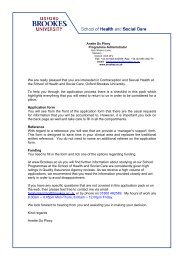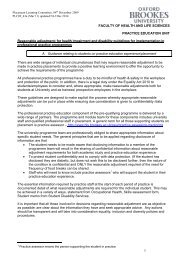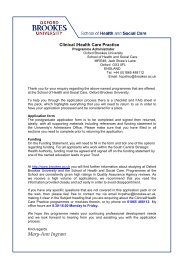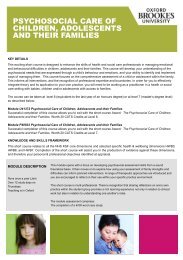Palliative Care DipHE - Oxford Brookes University
Palliative Care DipHE - Oxford Brookes University
Palliative Care DipHE - Oxford Brookes University
You also want an ePaper? Increase the reach of your titles
YUMPU automatically turns print PDFs into web optimized ePapers that Google loves.
Diploma in Higher Education in<strong>Palliative</strong> <strong>Care</strong> <strong>DipHE</strong>The Nairobi Hospice teaching team hopes this information will help you tounderstand the format and ideas underpinning the <strong>DipHE</strong> in <strong>Palliative</strong> <strong>Care</strong>.Aims of the courseThis course is a franchise agreementbetween Nairobi Hospice, Kenya and theSchool of Health and Social <strong>Care</strong>, <strong>Oxford</strong><strong>Brookes</strong> <strong>University</strong> and offers practitionersfrom Africa and neighbouring regions theopportunity to achieve an internationallyrespected qualifi cation with minimumabsence from their own practice andworkplace setting.This multidisciplinary course is designed toenable practitioners to develop skills andknowledge related to the care of individualsand families coping with a life-threateningillness and bereavement. Such care isinternationally recognised as palliative care.The <strong>DipHE</strong> in <strong>Palliative</strong> <strong>Care</strong> encourages youto develop a critical understanding of thephilosophical basis of palliative care and thesocio-political factors that infl uence it.Dates:Study Block 113th July – 18th July 2009Study Block 225th January – 29th January 2010Study Block 35th July – 9th July 2010Delivery of the courseVenue: Nairobi Hospice, PO Box 74818,Nairobi 00200, KenyaStaff: Nairobi Hospice teaching team.Study Blocks: The following subjects arecovered during three blocks of study:• Death and Dying• Impact of disease and themanagement of distressing symptoms• Relationships and the Dying• Understanding Pain• Bereavement• Professional Issues in <strong>Palliative</strong> <strong>Care</strong>.Format: The course will be delivered over onecalendar year, completing in approximately 18months. Each block will cover the content oftwo modules, and the fi rst block will includea preparation day for students and mentors.There will be support available for studentsand mentors via email between study blocks.Fees: Each module is priced at £300, thuseach study block costs £600. Thereforethe fee for the full Diploma course is£1,800. Travel, meals, reading material,accommodation and graduation costs are notincluded; Nairobi Hospice will be able to offersome guidance on suitable accommodationfor prospective students.
Course detailsThe course will enable you to achieve thefollowing:• an understanding of the philosophyof palliative care and how this isrepresented in practice.• the ability to deliver palliative caresensitively and with confi dence.You will be encouraged to deepen yourknowledge and skills in:• interdisciplinary teamwork andrelationships• the management of pain and otherdistressing symptoms• caring for people in crisis as a result ofterminal diagnosis or impending death• communicating with and supportingpeople facing loss, grief andbereavement• skills in using refl ection as a tool forprofessional practice• skills in independent learning• research mindedness• a wide range of transferable skillsrelating to practice competence andlifelong learning.The course is based on three fundamentalbeliefs that shape the way it is taught and theway in which you are encouraged to learn:First, the beliefs that underpin the philosophyand principles of palliative care have beenused in order to identify the key elements ofthe curriculum.Secondly, the course is designed in the beliefthat practice should guide the exploration oftheory and research and that students havea wealth of practice knowledge experiencesthat they can contribute to the course.Thirdly, the course team believes that suchexperiences are a crucial part of a student’smotivation to learn. The course thereforeencourages you to develop the skills inherentin learning from experience through strategiessuch as refl ective practice.During the course you are likely to experiencea variety of teaching approaches such asworkshops, lectures, seminars, tutorials andvisits. You will be encouraged to engage indifferent learning strategies, such as takingpart in seminars, giving presentations,participating in base groups and usingrefl ection as a way of analysing practice.The teaching and learning strategies willencourage you to challenge viewpointson aspects of palliative care, develop amultiprofessional perspective and develop arange of transferable skills.Course participantsStudents who have attended the courseto date have come from African countriesincluding Kenya, Uganda, Tanzania,Malawi, Swaziland and Zimbabwe andincludes nurses, doctors, social workers,physiotherapists, clinical offi cers andlecturers.ModulesThe course consists of the followingcore modules:Death and DyingDeepens your understanding of theories ofdeath and dying and the provision of care forthe dying and their families.Understanding PainExamines pain from physiological, emotional,contextual and spiritual perspectives.Therapeutic and comfort measures areexplored in depth.Relationships and the DyingExplores the roles and relationships of thedying person, their family and professionalcarers.Impact of Disease and the Management ofDistressing SymptomsExplores the impact of disease process on theindividual and family and the management of arange of distressing symptoms.BereavementExplores the developments of theories andgrief and bereavement and their relevance topractice.Professional issues in <strong>Palliative</strong> <strong>Care</strong>A synoptic module that integrates aspectsof cancer, HIV and AIDS and palliative careexplored in other modules with contextualfactors infl uencing palliative care services.
Admission requirementsStudents from a broad range of practicesettings are encouraged to undertake thisprogramme, as palliative care practice skillsare required by many professionals from verydifferent professional backgrounds.The <strong>University</strong> has an active inclusion policyand selection criteria are subject to theDisability Discrimination Act laws.Access to the course is available to allpractitioners who meet the following criteria:a) Be a health or social care professionalin the counrty in which you are currentlypracticing and have a minimum of 6months experienceb) You are currently employed in, or haveaccess to, a suitable practice settingc) You can produce evidence of suffi cientability to study at the proposed level andto express yourself clearly and fl uentlyin English (by submission of a piece ofwritten work)d) You have written support from yourmanager, if you are in employmente) You have a mentor fulfi lling the criteria setby the courseNB: You will normally need to supply evidencethat you have achieved the learning outcomesfor the introductory modules for the course.You will need to demonstrate that youhave an understanding of the principles of<strong>Palliative</strong> <strong>Care</strong>. Further details are given in theaccompanying literature.FeesThe fee for the full Diploma course is £1,800 orthe equivalent in Kenya shillings as invoiced byNairobi Hospice. Students, or their sponsors,are encouraged to pay this amount in full.Such payment must be paid at least twoweeks before commencing the course.Students wishing to pay by instalments mustpay £1080 two weeks before the date of thefi rst block and a fi nal instalment of £810 twoweeks before the date of the second block.Travel, meals, reading material,accommodation, medical care and graduationcosts are not included; Nairobi Hospice willbe able to offer some guidance on suitableaccommodation for prospective students.Refunds: The Nairobi Hospice policy is thatnormally refunds are not made.Nairobi HospiceThe Nairobi Hospice was established througha steering committee in November 1989 andoffi cially opened on 27 February 1990.The Hospice has spearheaded palliative careservices in Kenya, and has a reputationfor delivering a comprehensive and high qualitypalliative care service to the people of Nairobiand surrounding areas.This care involves skilled medical and nursingcare, psycho-social counselling, spiritual careand rehabilitation. In addition, it plays a leadingrole in promoting and delivering education forhealth care personnel in palliative care acrossAfrica. It also raises public awareness andadvocates the needs and the care of peoplewith life limiting illness.Student’s practice and thiscourse of studyThe aim of the <strong>Palliative</strong> <strong>Care</strong> course is tofurther develop practitioner’s ability to respondeffectively to patients who have palliativecare needs and their families. The course ispractice-based, meaning that every aspect ofthe programme centres on the developmentof your day-to-day practice to achieve moreknowledgeable and skilled practitioners.StudentcommentsA very challenging,stretching, growing wayof learning - well done!You have been sensitiveto the cultural aspect.The discussions havegiven us a chance torefl ect on culture andinterchange culturalvalues.The course hasimproved the quality ofcare that I am going togive my patients.It has been an eyeopenerto some of mytalents which I had notrecognised.
<strong>Oxford</strong> <strong>Brookes</strong><strong>University</strong><strong>Oxford</strong> <strong>Brookes</strong> <strong>University</strong> is an internationallyrecognised centre of academic excellence,gaining consistently high ratings in <strong>University</strong>league tables and the United Kingdomnational press. It attracts students from allover the world for the quality of its teaching,the fl exibility of its undergraduate andpostgraduate courses, and its commitment toleading edge research and consultancy.The School of Health andSocial <strong>Care</strong>It offers courses for pre-registration, postqualifyingand postgraduate studentscovering a broad range of clinical specialismsand there are opportunities to study forresearch degrees. Having completed theirstudies, many graduates of <strong>Oxford</strong> <strong>Brookes</strong>have gone on to pursue successful careersas clinical team leaders and, senior healthservice managers. Others have taken upteaching and other stimulating positions withinthe health and social care fi eld, both nationallyand internationally.The Development of the<strong>DipHE</strong> in <strong>Palliative</strong> <strong>Care</strong>The School of Health and Social <strong>Care</strong>pioneered the development of the <strong>DipHE</strong> in<strong>Palliative</strong> <strong>Care</strong> and <strong>Oxford</strong> <strong>Brookes</strong> was thefi rst university to offer the course, in 1991.Since then, further developments haveincluded the development of a Degree in<strong>Palliative</strong> <strong>Care</strong>, the fi rst Paediatric <strong>Palliative</strong><strong>Care</strong> course in the UK and the validation ofan MSc in <strong>Palliative</strong> <strong>Care</strong>.Learning and teaching methods areinnovative and varied, ranging from lecturesand seminars to action learning and casestudies. Assessment methods differ frommodule to module, but typically includea mixture of project work, case studies,extended essays or learning contracts.Many members of the <strong>Palliative</strong> <strong>Care</strong> teachingteam are themselves health or social carepractitioners holding senior posts, and arein constant touch with developments in theirspecialist fi elds.Further informationIf you would like to discuss the course orhave any questions please contact BrigidSirengo at the addresses or contactnumbers below.To apply please return the application formincluded with this information, together withyour written work to:➜Dr Brigid Sirengo OGW, HonDUnivChief Executive Offi cerNairobi HospiceP.O. Box 74818Nairobi00200KenyaTel: + 2542 (02) 712361 /2719383 / 2726502Fax: + 2542 (02) 722212Email: education@nairobihospice.or.keWebsite: www.nairobihospice.or.ke
















